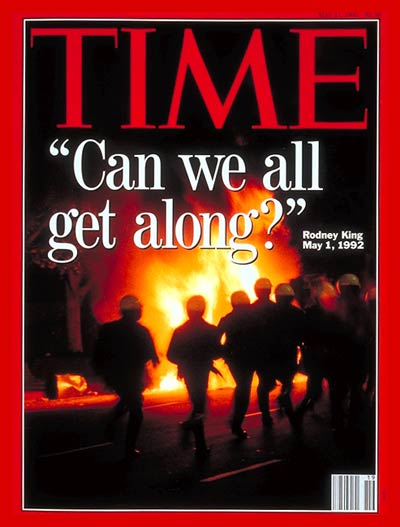
It was almost exactly 25 years ago — on April 29, 1992 — that four white Los Angeles Police Department officers were acquitted in the case of the beating of Rodney King, an unarmed black man who had led them on a highway chase. In the wake of the acquittals, all eyes turned to Los Angeles as a series of riots took place over five days. More than 50 people were killed during the riots, over 2,000 were injured, and the cost to repair the damage to over 1,000 area buildings was around $1 billion. It was the worst U.S. rioting since the 1965 Watts riots.
On Friday, the Tribeca Film Festival will screen the documentary LA 92, produced by National Geographic Documentary Films, which features rare archival footage from that period 25 years ago. In this exclusive clip from the film, firefighters struggle to respond to the city’s needs, and California Governor Pete Wilson declares a state of emergency for Los Angeles.
Following the riots, Rodney King’s much-quoted appeal for calm — ”Can we all get along?” — ended up on the cover of the May 11, 1992, issue of TIME. (Magazine staffers like correspondent Jim Willwerth, who got punched in the head, were among the many reporters who got hurt in the rioting.) The following excerpt from the cover story explained how the riots made the nation face a divide that some had tried to ignore:
It had not exactly been unknown that race relations were worsening; a hundred voices had said so. But not until last week did many whites and blacks realize how deep an abyss had been opening at their feet. And last week’s violence is all too likely to make the gulf still wider and deeper. For blacks the acquittal, and for whites the aftermath, tended to confirm each race’s worst fears and suspicions about the other.
Blacks have far more than police brutality to worry about: high unemployment, widespread poverty, poor schools, drug peddlers and criminals who prey on their neighborhoods. But it is no accident that nearly all the great ghetto riots since the 1960s have been triggered by some incident involving arrested blacks and white cops. To an extent that whites can barely even imagine — because it so rarely happens to them — police brutality to many blacks is an ever present threat to their bodies and lives.
Indeed, few things more vividly illustrate the extent to which whites and blacks live in different worlds than their reactions to police brutality.
In recent years, movements like Black Lives Matter have brought renewed attention to the enduring nature of that division.
The documentary LA 92 will also air on the National Geographic channel on April 30 at 9 p.m. ET/8 p.m. CT.
More Must-Reads From TIME
- The 100 Most Influential People of 2024
- The Revolution of Yulia Navalnaya
- 6 Compliments That Land Every Time
- What's the Deal With the Bitcoin Halving?
- If You're Dating Right Now , You're Brave: Column
- The AI That Could Heal a Divided Internet
- Fallout Is a Brilliant Model for the Future of Video Game Adaptations
- Want Weekly Recs on What to Watch, Read, and More? Sign Up for Worth Your Time
Write to Olivia B. Waxman at olivia.waxman@time.com